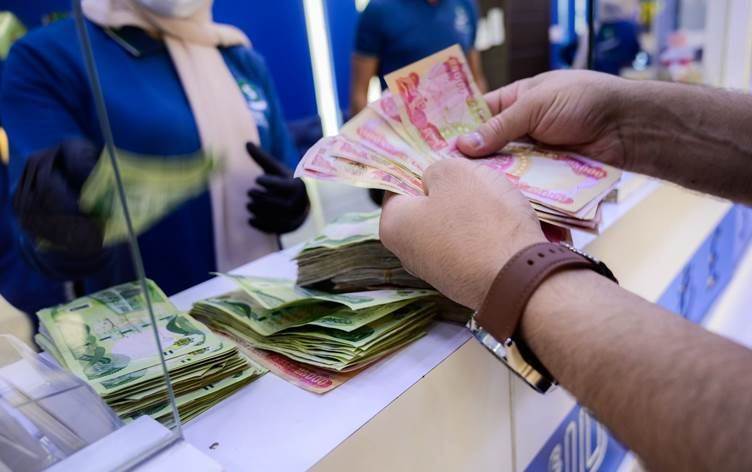Salary deduction: The government's "easiest solution" for financial crisis

Shafaq News / It became evident that whenever a financial crisis runs the government, the employees' salaries are always the victim. Deductions and taxes' imposition became a rule of thumb for the consecutive governments to confront those crises. The government inherited its predecessor failures in liberating the economy, reviving the private sector, and suppress Rentierism. Successive governments blame their predecessors for failure as they juggle this fireball amongst each other.
The current government seeks to offset the fiscal deficit in the 2021 budget and provide financial liquidity to cover employees' salaries by maximizing its financial resources, including applying the income tax law to the state employees' salaries.
Law 113 of 1982 and its amendments stipulate that the employee's salary, allowances, and all sort of income must be subjected to taxation.
However, economists do not appeal to imposing income tax on the employees' salaries, considering that this will lead to the decay of the middle class and raise the poverty in the country.
Twisting the truth
"Parliament has resorted to this tax to provide some kind of legal coverage to the deduction while the previous deduction, which was planned, is illegal", finance expert, Hilal Al-Tahhan, told Shafaq News agency.
"A fundamental fact in public finances: public sector employees' salaries are fragile and very sensitive to changes in the general level of prices. Therefore, imposing income taxes or any deduction substantially affects the living standards and prices in the market", he explained.
"Finance professionals prefer not to resort to such taxes and deductions..Instead, other ways can be used, such as regulating the cars purchases, office furniture, and others," he added.
"Imposing such taxes on income will increase poverty, especially since employees make up a large proportion of Iraqi society - and this is confirmed recently by the Ministry of Planning. Most of the employees after 2003 receive only 750,000 dinars as salaries – and some earn even less", Al-Tahhan concluded.
Income tax destroys the market
"Income taxation on salaries will increase the cash flow crisis in the Iraqi market because of the devaluation of the dinar, and the private sector will lose tens of thousands of jobs. Any deduction under any name is destructive to the market. Also, any current levy most probably ends in the corrupts' pockets and will not be spent on the state's institutions.. So these damages do not have any benefits worth sacrificing for", Dhargham Mohammed Ali, head of the economic media center, said to Shafaq News agency.
"There are other alternatives that the government can resort to instead of taxing the employees' salaries, namely controlling the collection and seriously fighting corruption. Deduction under any name is illegal, immoral, and violates the parliament's commitments", Dhargham added.
The government requires income tax
"Income tax is stipulated in the 1982 law and, therefore, it is one of the state's crucial revenues. If the public finances continued to undermine the details, it would ultimately collapse. Public finances are collected like grains of sand to form a great mountain", Mudhir Mohammed Salih, the PM's advisor for finance and economic affairs, stated to Shafaq News agency.
"Due to the rentierism of the Iraqi economy - which is oil and it yields a lot - we have neglected many other revenues. This poses a permanent risk to the state. For this reason, it is crucial and due", Salih said.
He also pointed out, "the income tax law was applied over the last period due to an administrative decision on nominal salary only - and did not include allocations. While in Iraq, the allowance sits twice as high as the nominal salary, and therefore this decision will be applied per the law on nominal salary as well as allowances".
"The tax should be imposed fairly on everyone without any exceptions. Statistics, the size of the family, wife, and children, discounts, and minimum salary must be taken into account. Tax evasion is a major crime punishable by law", he added.
The employees are the weakest link
"The employee is always the weakest link, and our salaries are the victim of any financial problem facing the government," said Talib Mohammed Hussein, an employee in the Ministry of Education.
"The employee has become threatened - like the private sector worker - with bankruptcy and poverty because of these policies adopted by the government. Eliminating corruption will spare the government these deductions and more poverty", he added.
In an interview with Shafaq News agency, Industry Ministry employee Ihsan Breesam described the government's decisions to reduce the employees' salaries as "punishment" and referred to "the failure of government policies in the administration of the state despite the billions of dollars it has made over the years but faded into the pockets of the corrupts without establishing a single project."
"All the countries neighboring Iraq - even those devoid of crude oil and other resources that Iraq is rich with - have managed to overcome the COVİD-19 crisis without resorting to compromising its employees' salaries", he said.
According to some Parliamentarians, employee salary deductions have been rejected, and income tax for high-income people was adopted in the 2021 budget. Considering deductions in income tax will not be sufficient, excluding low-income groups.
The Iraqi government is struggling to secure employee salaries and other operating expenses due to the collapse of oil prices caused by the COVID
-19 pandemic, which has crippled large sectors of the world's economy. The country relies on raw oil revenue to finance 95% of state expenditures.
The state has been forced to devalue the local currency against the U.S. dollar to provide the salaries it paid in the fourth quarter of 2020 through the fiscal deficit law passed by parliament.





